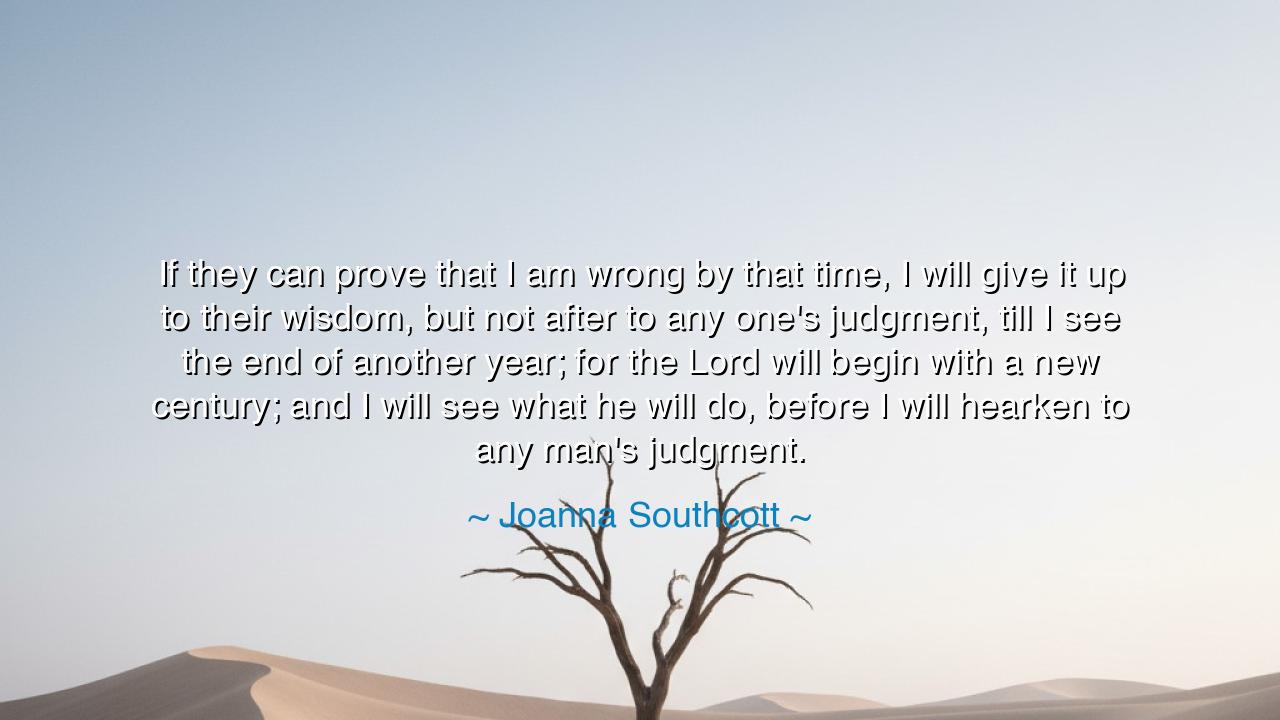
If they can prove that I am wrong by that time, I will give it
If they can prove that I am wrong by that time, I will give it up to their wisdom, but not after to any one's judgment, till I see the end of another year; for the Lord will begin with a new century; and I will see what he will do, before I will hearken to any man's judgment.






Joanna Southcott, the prophetess of Devon, uttered these resolute words: “If they can prove that I am wrong by that time, I will give it up to their wisdom, but not after to any one's judgment, till I see the end of another year; for the Lord will begin with a new century; and I will see what he will do, before I will hearken to any man's judgment.” In this declaration burns the spirit of defiance against human scorn and the unwavering trust in divine timing. For Southcott, wisdom belonged not to men but to God, and her faith in His revelation outweighed the doubts and mockery of her age.
The meaning is layered with courage and conviction. She does not reject judgment outright, but insists that it must be measured against the unfolding of time and the providence of God. To abandon faith too soon, before the divine plan has ripened, would be weakness; to cling to it until God Himself reveals otherwise is strength. In this she teaches that the voice of the Eternal cannot be silenced by the impatience of men, for only the passing of seasons and the turning of centuries can disclose whether prophecy stands true.
Her own life gives flesh to these words. In the late 18th and early 19th centuries, Joanna Southcott claimed visions of the end times and declared herself the “woman clothed with the sun” from the Book of Revelation. She gained thousands of followers, many of whom treasured her “sealed prophecies.” Mocked by scholars and clergy, she held steadfast, proclaiming that the truth of her mission would be revealed in due time. Her insistence on awaiting the new century was both a sign of her unyielding faith and her challenge to the wisdom of men who demanded immediate proof.
This tension between human doubt and divine promise is as old as history itself. Consider Noah, who built his ark under the ridicule of neighbors, trusting that only the fulfillment of God’s word would justify his labor. So too did Southcott place her hope not in the judgment of contemporaries, but in the unfolding acts of the Lord. Whether or not her visions were fulfilled, her life became a testimony to the power of faith held against the tide of worldly scorn.
Therefore, let us take heed of her lesson. True conviction is not easily surrendered to the laughter of men. To cling to faith until time itself proves it false is, in its own way, an act of courage. And though the world may mock the prophets, their voices remind us that wisdom does not always lie with the majority, nor with those who demand immediate answers, but often with the steadfast soul who dares to wait for the judgment of eternity.






MKTran minh khoa
This quote feels both prophetic and defiant. Southcott’s insistence on divine proof rather than human opinion reflects a faith that transcends rational debate. Yet, it also raises a concern: what happens when personal faith rejects all external accountability? I’m curious whether she saw this as a test of faith or as a statement of authority. Either way, it highlights the enduring struggle between spiritual conviction and collective reasoning.
NNngoc nguyen
As a reader, I’m struck by how personal revelation seems to override reason in this statement. It makes me think about the tension between spiritual conviction and empirical validation. How can someone remain firm in their beliefs while still engaging with differing perspectives? Southcott’s certainty feels admirable, but it also seems isolating. Perhaps she valued divine timing so much that she couldn’t trust human timelines at all.
VKnguyen van kiet
I find this passage intriguing because it shows a person’s unwavering belief in divine order. It almost sounds like she’s saying that only time—and God’s will—can prove truth. But isn’t there danger in dismissing human judgment entirely? Faith can be powerful, but it can also blind us to evidence. I wonder whether Southcott’s stance reflects deep spiritual wisdom or a reluctance to accept fallibility in her own interpretation.
HNViet Hien Nguyen
This quote fascinates me because it reveals a deep mix of faith and defiance. It seems Southcott trusted divine timing over human reasoning, which raises an interesting question—when does conviction become stubbornness? I respect her confidence in spiritual truth, but I also wonder how one can balance faith with openness to correction. Is waiting for a ‘sign from God’ a form of patience, or a way of resisting uncomfortable truths?